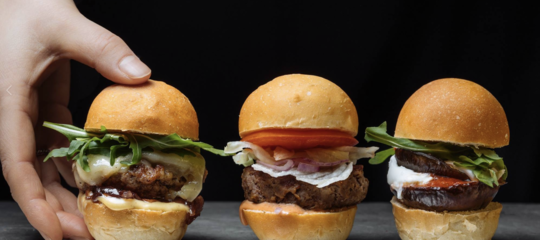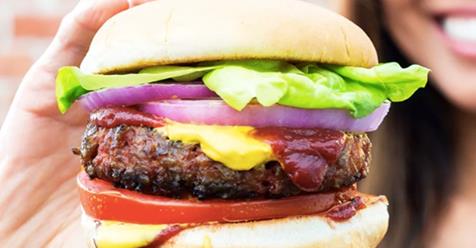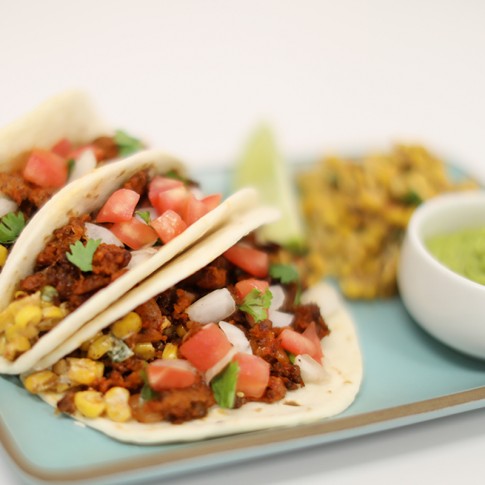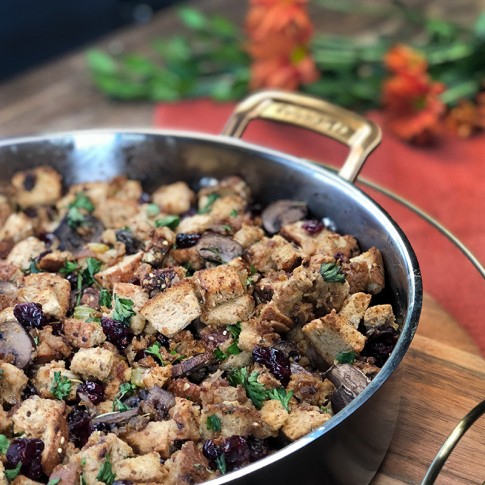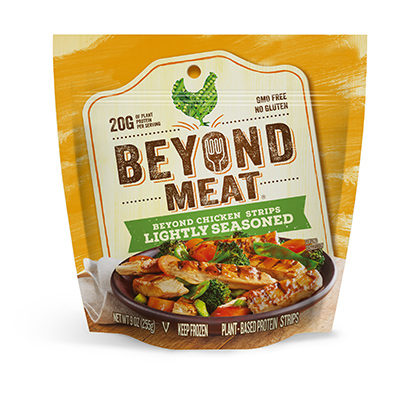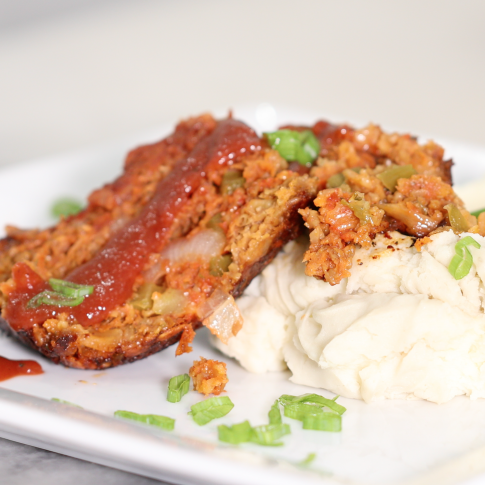By Roberta Secci
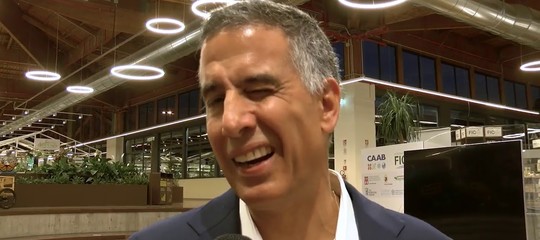
Joseph “Jody” Puglisi, a scientist and biology professor at Stanford—seen here launching his sustainable “vegetable meat” products in Italy—his grandparents’ native land.
Editor’s Note: Because our school newspaper is digital, we have readers all around the world. Occasionally, foreign journalists admire us and offer us reprint opportunities for translated stories they think might appeal to a school of American teens from diverse backgrounds who are studying for careers in science, technology, engineering or mathematics. The article below appeared in mid-January on the Rome-based news website AGI (an acronym for the Italian Journalistic Agency). Roberta Secci is an Italian journalist based in Sardinia. She wrote the following story celebrating a successful Italian-American scientist who recently returned to his family’s country of origen to promote his lab-created meat products in Italy. Her article reminds both Italians and Americans—contrary to the anti-immigrant rhetoric of the Trump presidency—to be proud of the many great things the children of immigrants can—and do—achieve.
§ § §
An Italian-American scientist from the University of Stanford created an innovative formula for vegetable meat—a culinary invention its U.S. manufacturer hopes will change global eating habits. ‘Beyond Meat,’ was born as a startup venture in California in 2009, but arrived just last autumn as a competitor on the highly traditional (and qualitatively demanding) Italian food market.
Made from non-genetically modified plant proteins, these ‘fake burgers’ that simulate the appearance, smell, color and consistency of beef, are currently being served by ‘Welldone’—the gourmet burger chain from the city of Bologna that has around fifteen locations across the Italian mainland and the Italian Emerald Coast. It was 56-year-old Joseph Puglisi (the structural biologist responsible for this unusual product), who most wanted the concept of Beyond Meat to be accepted in the ancestral home of his food-loving Italian grandparents.
During the last months of 2018, Puglisi first introduced his vegetarian meat in the town of Bologna, during its Third International Awards for Sustainable Agriculture event. His presentation there resulted in his earning the prestigious title: “City of Food Master, 2018.” Puglisi subsequently attracted similar kudos in Rome at the European edition of “Maker Faire,” an exhibition for inventors already known in America as the best public showcase for all things high-tech, intelligent, and entrepreneurial.
In 2014, Joseph Puglisi became a protein expert for the Ethan Brown Company. They tasked Puglisi with inventing a meat-substitute in the laboratory that was more sustainable for the environment, yet so similar to actual meat that carnivores would be easily convinced to try it. Puglisi’s creation does not contain GMOs, gluten, cholesterol, soy, hormones or antibiotics. But do not call it “fake” or “synthetic,” warns Puglisi, who strangely prefers to call his invention “vegetable flesh.”
“I became Beyond Meat’s scientific advisor,” says Puglisi by phone from the United States to AGI. “I put together a team of researchers, all under 30, with no experience in the field of nutrition: these were chemists, biochemists, engineers. It was important that they had no restrictive preconceptions [about food]”.
Only afterwards did the food experts and even the chefs become part of Puglisi’s scientific team that now—at their El Segundo headquarters near Los Angeles—has grown to 40 people. “We made hundreds of attempts to create this product, and I must admit that at the beginning, some were really crappy,” admits Puglisi, a PhD and a member of the National Academy of Sciences. “We have deliberately excluded any shortcuts, choosing only ingredients of plant origin, and not GMOs”, adds this PhD and member of the National Academy of Sciences. “Compared to the intensive production of beef, our vegetable alternative allows producers to conserve 95% more soil, 99% more water and to cut related greenhouse gas emissions by 90%.”
The above study, which also estimates energy savings of 46%, is from the University of Michigan and compares the environmental impact of producing one pound (about 450 grams) of vegetable burger with what it entails to obtain a similar amount of hamburger from American cattle farms. The amount of protein, according to the nutritional information on the label, is comparable to that contained in beef, except the Beyond Burger offers a double percentage of iron and lower amounts of saturated fat.
“We faced a difficult challenge, and when it comes to science, we need to tackle a problem by looking at it from different and innovative points of view,” explains Puglisi. “The scientists of the research team investigated the biochemical model of meat, which is made up of proteins, fats, water and minerals, then worked on replicating a similar structure from plant sources.”
Beyond Meat’s “hamburger” is composed of yellow peas (produced in France and Canada), vegetable oils (canola and coconut), and beetroot juice which simulates the color of red meat. So far those who’ve tasted the Beyond Burger were sufficiently satisfied by the vegetal substitute that they didn’t regret it not being actual meat.
“Our goal is to create a product that presents the sensory experience of eating meat—replicating its sight, smell, and texture—but in a way that is sustainable and healthy.”
Last November, Beyond Meat announced its initial public offering (IPO) on Nasdaq under the symbol ‘Bynd’, in an attempt to raise 100 million dollars of operating capital. At the time their leading products included sausages that simulate pork meat, and fingerlike ‘strips’ that mimic chicken.
‘Eat what you love,’ is a motto that reveals the commercial strategy of Beyond Meat. The company wants to provide the consumer with an appealing product which resembles meat as much as possible, and at the same time does not completely disrupt one’s previous eating habits.
Over the past five or six years in America, Beyond Meat has been available from the popular organic food chain known as Whole Foods Market. But since early January of 2019, an updated formula called “Beyond Burger 2.0” has been a featured menu item at “Carl Jr’s.” restaurants in the U.S., as well as at A & W in Canada. The ‘Beyond Burger 2.0’, is made with peas, brown rice and mung beans. This updated formula contains all the essential amino acids, has even less saturated fat, and is Kosher certified in compliance with the nutritional rules of observant Jews.
The central concern of Puglisi, who is a minor shareholder of Beyond Meat, remains ecological sustainability, combined with a desire to counteract the illnesses linked to poor diet that have become epidemic in the United States. He wants to protect the health of both people and the planet itself. “How do you feed 9.6 billion people in the future with healthy and sustainable food, “ asks Puglisi, “in a world where meat consumption is booming—especially in Asia?” This is one of the biggest conundrums facing agricultural experts worldwide as we look towards 2050. One possible solution is clearly vegetable meats.
Another major obstacle to popularizing the “beyond burger” is that it costs just as much as its high-end bovine counterpart. “If we want it to be eaten in fast food restaurants,” Puglisi explains, “we must ensure that the selling price is lower. I never intended to create a product only for rich people who can already choose to eat healthier, but one that is accessible to everyone .”
Once the cost-factor becomes less of an issue, the corporate plan is to win more consumers by locally and nationally distributing a vegetable version of whatever types of meat are most popular among different populations. Beyond Meat already has one American patent, and has started the procedure to obtain another 20…twelve of which are international. Puglisi is also aware that Beyond Meat is neither the first nor the only company serving meat-substitutes. Their competitors include brands like Boca Foods, Field Roast Grain Meat Co., Gardein, Impossible Foods, Lightlife, Morningstar Farms and Tofurky.
Last November, Beyond Meat, which invests heavily in innovative strategies, declared a net loss of $ 22.4 million. Yet it has attracted backers like Bill Gates of Microsoft, plus public endorsements from media stars like Leonardo di Caprio, and food-industry pundits like Don Thompson, the former CEO of McDonald’s Corp. Most importantly, one of its major shareholders is Tyson Food Inc, the largest meat producer in the United States. The company’s declared objective is to secure a slice of the world meat market (estimated at $1,400 billion dollars) by using a strategy similar to the one that resulted in the success of the vegetable ‘dairy’ industry: putting out better tasting milk substitutes, and then selling them on the same shelves as milk-based equivalents.
Although the long-term impact on consumers’ health of using meat substitutes created in the laboratory is still unknown, Puglisi assures us that research is underway to prove the value of switching to his product. He and his research team are already running a small clinical study to compare the dietary effects on human health of eating Beyond Meat compared to continuing to consume the same amount of animal meat. But no need to wait for the research when this ambitious company remains determined to offer ever more delicious and ecologically-sane choices for anyone willing to attempt a more vegetarian lifestyle.
LINK TO ORIGINAL ARTICLE IN ITALIAN: https://www.agi.it/cronaca/carne_hamburgher_vegetale-4828918/news/2019-01-13/
